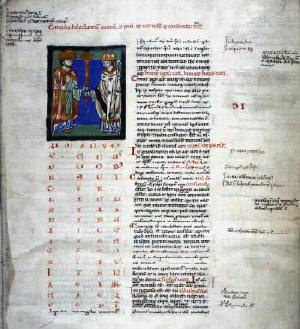This course surveys European legal history from Roman law to the Renaissance of Roman law as part of the Ius commune in the eleventh and twelfth centuries. The purpose of the course is to introduce two of the great legal traditions of the Western European tradition: Roman law and the Ius commune. The course will begin with an examination of Justinians Corpus iuris civilis in the sixth century AD. It will explore the main areas of Roman family law, torts, contracts, property law. After establishing the broad outline of Roman legal concepts, the course will explore the revival of Roman law in Italy at the end of the eleventh century and its adoption by the law schools of Europe, and its integration into the Ius commune. This part of the course will describe how the jurists of the twelfth to the eighteenth centuries used principles, norms, categories, and concepts of Roman law and applied them to every European legal system.
The legal system that will occupy most of the course will be the Ius
commune (Common Law). Unlike our Common Law, the Ius commune was a
pan-European legal system that held sway over Europe from the twelfth to the
eighteenth century. It was the only
 law taught at European universities
until the seventeenth century. Most of the legal principles, concepts, and
all the Latin tags that we use today come from the Ius commune. If you
studied law before ca. 1800 at a university, you studied canon law, Roman
law, and feudal law, the constituent parts of the Ius commune. When you
graduated, you earned a degree of Doctor of both laws (Doctor utriusque
iuris).
law taught at European universities
until the seventeenth century. Most of the legal principles, concepts, and
all the Latin tags that we use today come from the Ius commune. If you
studied law before ca. 1800 at a university, you studied canon law, Roman
law, and feudal law, the constituent parts of the Ius commune. When you
graduated, you earned a degree of Doctor of both laws (Doctor utriusque
iuris).
For those of you who are interested in adding legal history to your studies, you will have the opportunity to study law in Sicily. Second year students and third year students who take Foundations of Modern Law, or the History of Canon Law (taught in the Fall semester), or who do independent studies in the history of English or American law, will be eligible to win a fellowship to study for 10 days at the International School of the Ius commune in Erice, Sicily in October of 2010. These fellowships pay for transportation, room, and board in Erice and offer the possibility to meet law students from other European countries. Erice is located in the NW corner of Sicily next to the Mediterranean and is one of the most beautiful spots on earth (see http://faculty.cua.edu/pennington/erice.htm).
This semester Law 508-Canon Law 760, The Comparative Foundations of Modern Law, will meet Tuesdays and Thursdays at 1:10-2:25 P.M. in Caldwell Hall 111. The course will require two essays.